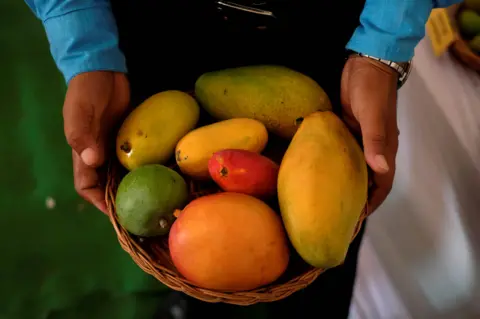In the realm of diabetes management, dietary choices play a crucial role, especially when it comes to carbohydrates and sugars. A recent article sheds light on an interesting question that frequently arises among Indian diabetics: “Can I eat mangoes?” Mangoes, known as the “king of fruits,” are a cherished delicacy in Indian culture, and their seasonal abundance raises concerns for many diabetics who fear the fruit’s natural sugars will worsen their condition. Diabetologist Rahul Baxi underscores the misconceptions surrounding mango consumption, which range from outright avoidance to the unwarranted belief that excessive consumption could reverse diabetes.
The controversy over mango consumption is not without merit. Many patients returning for follow-up visits post-mango season report elevated glucose levels, leading to further scrutiny of this beloved fruit’s impact on health. However, recent research is offering a paradigm shift, suggesting that mangoes may not be the dietary adversaries they’ve long been considered.
Two pivotal studies conducted in India have challenged conventional dietary wisdom surrounding mangoes. These trials propose that replacing typical carbohydrate sources, such as white bread, with controlled portions of mango could actually enhance blood sugar control and metabolic health in individuals diagnosed with type 2 diabetes. The International Diabetes Federation indicates that type 2 diabetes accounts for over 90% of global diabetes cases, with projected increases in its prevalence, particularly due to lifestyle factors like excess weight. In India alone, approximately 77 million adults suffer from this condition, while nearly 25 million are classified as prediabetic.
The results from the clinical studies have unveiled some promising figures, indicating that three well-known Indian mango varieties—Safeda, Dasheri, and Langra—produced glycemic responses comparable to or even lower than those caused by white bread. Continuous glucose monitoring over three days further revealed that individuals with diabetes exhibited significantly lower post-meal sugar fluctuations after consuming mangoes, suggesting that mangoes could be safely integrated into diabetic diets within moderation.
Dr. Sugandha Kehar, a primary author of the studies, noted that the findings counter preconceived notions about mangoes’ detrimental effects on blood glucose levels, suggesting instead that they might offer benefits under the right circumstances. Similarly, a separate eight-week randomized trial, funded by the Indian Council of Medical Research at Delhi’s Fortis C-DOC, found significant health improvements in patients who replaced their normal breakfast carbohydrates with mango. Key indicators such as fasting glucose, insulin resistance, and HDL cholesterol showed positive changes, reinforcing the idea that mangoes could serve as a healthy dietary substitute when monitored correctly.
The recommendations emerging from these findings emphasize moderation. Prof. Anoop Misra, a leading expert on the study, highlights the importance of portion control, emphasizing that diabetics should incorporate mango calories into their daily caloric intake rather than adding them extra. For instance, consuming around 250g of mango, roughly one small fruit, translates to approximately 180 calories, advocating for its replacement of an equivalent carbohydrate portion to facilitate the same beneficial results.
Culturally, mangoes hold a significant place in Indian society beyond their nutritional properties. With over 1,000 varieties grown across the country, mangoes are more than just a fruit—they symbolize friendship and goodwill, enhancing diplomatic ties as well. Termed “mango diplomacy,” this practice involves gifting crates of mangoes as tokens of goodwill in international relations.
In conclusion, while the image of mangoes as a sugary indulgence looms over diabetic diets, emerging evidence paints a nuanced picture. These delightful fruits, when consumed mindfully and in appropriate portions, can indeed be integrated into a diabetic-friendly diet. Their place in the social and cultural tapestry of India adds richness to the conversation, making them not only a cherished delight but potentially a surprising ally in blood sugar management. By balancing cultural appreciation with scientific understanding, mangoes can remain a beloved staple during their season.












